Île-Grande
| Native name: <span class="nickname" ">Enez-Veur | |
|---|---|
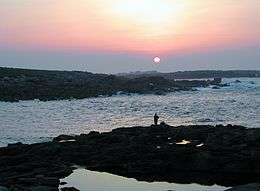 Pointe de Toull-ar-Staon, on the north-west of the island | |
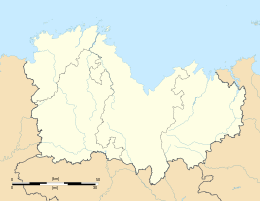 Île-Grande | |
| Geography | |
| Location | English Channel |
| Coordinates | 48°48′05″N 3°34′30″W / 48.8013°N 3.575°WCoordinates: 48°48′05″N 3°34′30″W / 48.8013°N 3.575°W |
| Length | 2 km (1.2 mi) |
| Width | 1 km (0.6 mi) |
| Administration | |
| Region | Brittany |
| Department | Côtes-d'Armor |
| Arrondissement | Lannion |
Île-Grande (Enez-Veur in Breton) is an island on the north coast of Brittany (France), linked to the mainland by a road. Its size is about 2 km by 1 km, and there is a village on the island. It is in the commune of Pleumeur-Bodou (department of Côtes-d'Armor).
A smaller island, Île Aganton, is to the west, adjacent to Île-Grande. On the coast, Trébeurden lies to the south-west, and Trégastel to the east.
Prehistory
In the centre of the island is a prehistoric site, an allée couverte (gallery grave). The site is known as Ty-Lia or Ty-ar-C'horrandoned. Constructed in neolithic times, its size is about 9 metres by 1.5 metres; several upright stones support two large stone slabs.[1][2]
Literary associations
The writer Joseph Conrad stayed at a house in Île-Grande from 7 April to 14 August 1896, during his honeymoon. He worked there on his novel The Rescue. His short story "The Idiots" was set in the area, and includes many details observed during his stay there; granite-quarrying is mentioned, which was important for the island at that time.[3]
Gallery
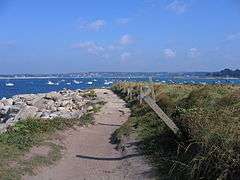 Porz Gelen, on the north-east of the island
Porz Gelen, on the north-east of the island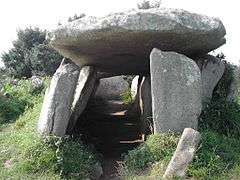 The gallery grave
The gallery grave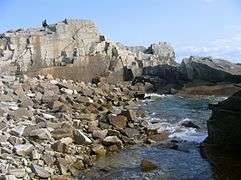 An old quarry
An old quarry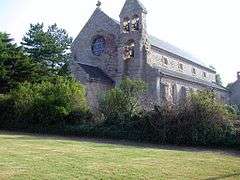 St Mark's Church
St Mark's Church- Le Corbeau, seen from the north of the island
References
- ↑ Allée couverte, dite Ty-Lia ou Ty-ar-C'Horrandened Base Mérimée, French Ministry of Culture, accessed 14 August 2015.
- ↑ Ty-Lia The Megalithic Portal, accessed 14 August 2015.
- ↑ Joseph Conrad à Lannion et l’Ile grande Terres d'écrivains, accessed 14 August 2015.